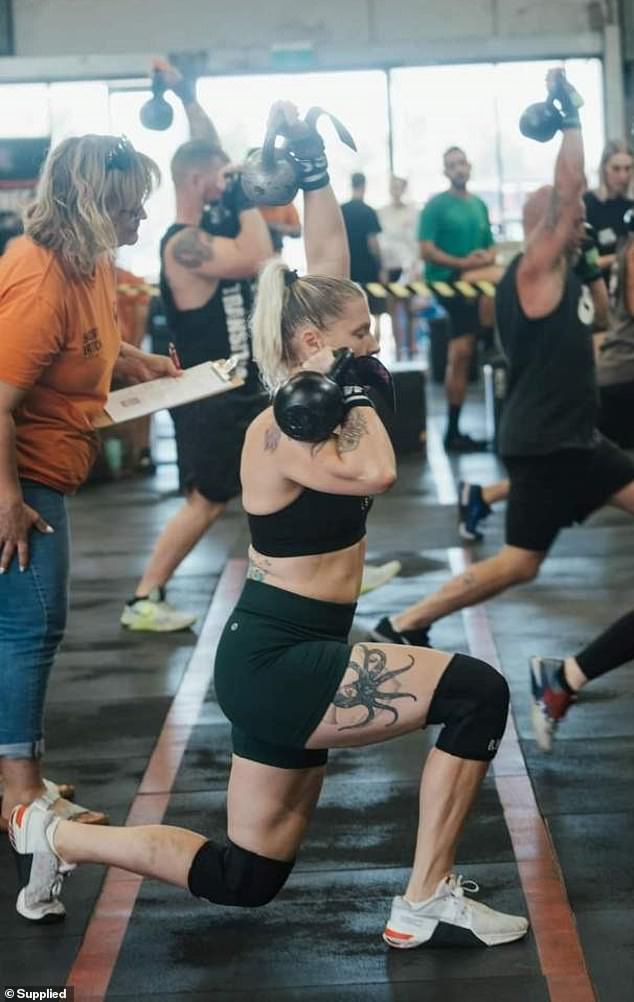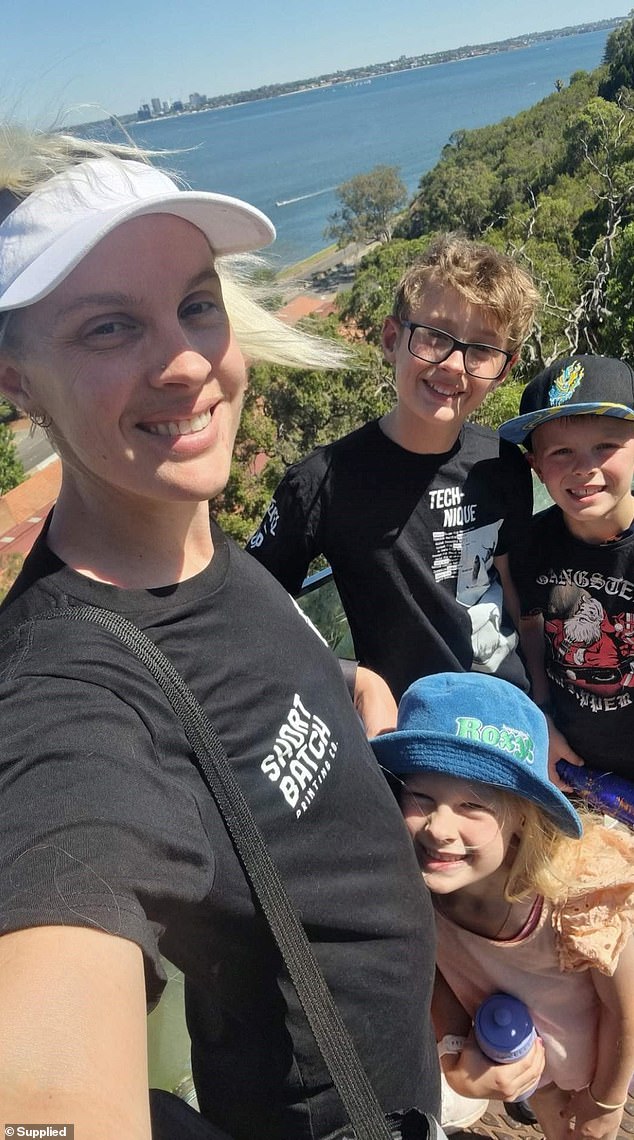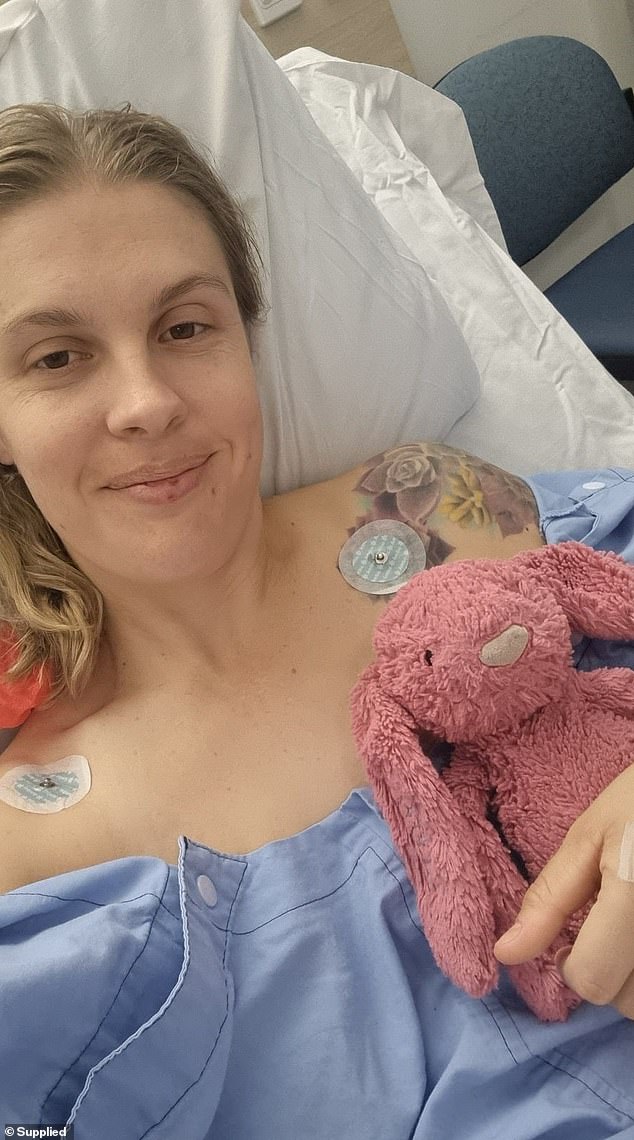Heartbreaking decision super-fit mum was forced to make after learning her ‘CrossFit injury’ was actually an aggressive cancer: Here is the only warning sign her life was about to change forever
A fitness enthusiast and mother of three has revealed how she lost her left leg after being diagnosed with cancer, thinking her only symptom was an injury she sustained at the gym.
Bec Macnamara from Baldivis in Western Australia experienced pain in her left knee while training for a CrossFit competition in November last year.
The 36-year-old told Daily Mail Australia she assumed the pain was simply due to the intense training she was doing at the gym and consulted her physiotherapist.
But months later, the athletic mom was diagnosed with an illness that ultimately forced her to choose how much of her leg to amputate.
“We worked for a while on what we thought was a knee injury. I did have some tenderness in my thigh but the physiotherapist thought that was secondary to the knee injury,” said Ms Macnamara.
“But after a few months… it just got worse. And the pain in my thigh got worse.”
Mrs Macnamara was sent to hospital in April this year for an MRI scan, which revealed she had a 20cm cancerous lesion in her left thigh.
“That was a bit of a shock because I expected my training to lead to muscle strains or ligament damage or something like that,” she said.
Bec Macnamara (pictured with children Pippa, Jasper and Toby) experienced pain in her knee while training at a CrossFit gym in November last year

The 36-year-old mother of three said she assumed the pain was caused by intense gym workouts before an MRI revealed she had a 20cm cancerous lesion in her thigh
‘So it was a huge shock to see on the MRI scan something that was suspected to be cancer.’
Mrs Macnamara underwent a surgical biopsy where doctors took samples from her thigh and a bone marrow biopsy from the back of her hip.
She was diagnosed with histiocytic sarcoma, an extremely rare and aggressive form of blood and bone cancer.
Only one doctor from the State Sarcoma Service at Sir Charles Gairdner Hospital in Perth had ever treated Bec’s type of cancer before.
In addition, the cancer spread rapidly and had reached the soft tissues and muscles in her thigh within weeks of diagnosis.
Mrs Macnamara was offered several treatment options, including removing and reconstructing only her lower leg, rather than a complete amputation.
However, this option did not exclude the possibility of further surgery and carried a high risk of infection and a longer recovery time.
‘That was probably the main reason why I decided to go for the amputation, because it was emphasized to me that because [the cancer] “It was so aggressive in nature that it was really important that I got chemotherapy as quickly as possible,” Ms Macnamara said.
‘For me, with three young children, would rather lose the leg and have a better chance of survival than ‘Running the risk that you may not actually survive.’
However, just hours before the amputation, doctors changed course and decided to save Mrs Macnamara’s leg by reducing the defect with chemotherapy.
But things didn’t go quite as planned.

Earlier this year, Mrs Macnamara (pictured with her three children, seven-year-old Pippa, nine-year-old Jasper and 13-year-old Toby) was diagnosed with histiocytic sarcoma, an extremely rare and aggressive form of blood and bone cancer.
Ms Macnamara said her thigh bone ‘just broke’ as she tried to position herself in her hospital bed the day after her first round of chemotherapy.
“I heard a huge bang and felt a huge pain. And yes, I knew right away that it was broken. I could see in my leg that it was broken,” she said.
“So the plans changed again. There was no way my body was going to heal the fracture, with all that disease in it. We ended up having to do another surgery and amputation.”
Just over two weeks ago, Mrs Macnamara’s entire femur was removed from the hip socket in an operation called a hip disarticulation.
She still has to undergo five rounds of chemotherapy, 21 days apart.
“I’m also aware that many of these rare cancers don’t respond to normal treatments,” she said.
‘Sometimes medications are needed, such as immunotherapy or medications that are not covered by Medicare, or medications or treatments that are not even available in Australia.
‘So while I’m definitely trying to stay positive and keep my fingers crossed… ‘That certainly stays in the back of my mind.’

Just over two weeks ago, Mrs Macnamara’s entire thigh bone was removed from her hip socket in an operation called a hip disarticulation (she is pictured recovering in hospital)
Mrs Macnamara also hopes to be fitted with a prosthesis so she has the best chance of living a normal life again.
Her parents have flown over from Queensland to help her with cooking, cleaning and shopping while she recovers during the school holidays.
She is also supported by her CrossFit community, with the owner of her Port Kennedy gym, Anthony Bartlett, a GoFundMe.
“Bec is such a strong woman and she fights for her family every day. The future is looking brighter but there is so much we need to help her with as she learns to live a little differently,” Mr Bartlett wrote.
Mrs Macnamara said her children, seven-year-old Pippa, nine-year-old Jasper and 13-year-old Toby, use humour to cope with her diagnosis.
We joke about hiding lollipops in a prosthetic leg or “I love that I can buy shoes for half the price because I only need one,” she said.
She said the thought of getting back into the gym and supporting her children kept her motivated for her upcoming chemotherapy.
‘I try “I want to make it as easy as possible for them and do everything I can to make sure I can be there to see them grow up,” she said.
